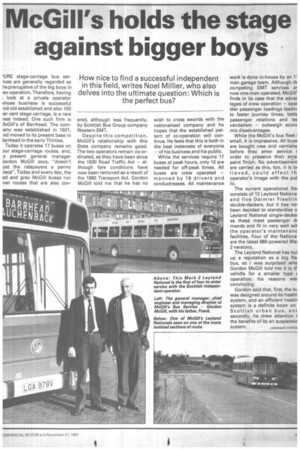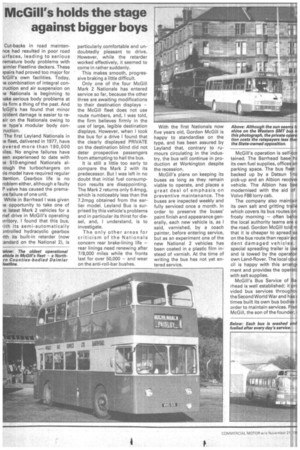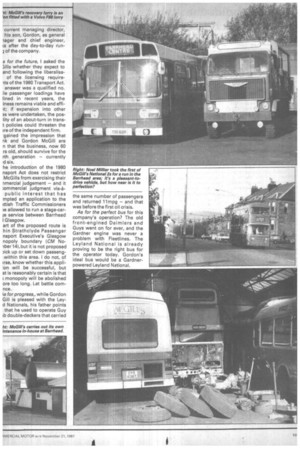McGill's holds the stage against bigger boys
Page 35

Page 36

Page 37

If you've noticed an error in this article please click here to report it so we can fix it.
How nice to find a successful independent in this field, writes Noel Millier, who also delves into the ultimate question: Which is the perfect bus?
'URE stage-carriage bus serices are generally regarded as he prerogative of the big boys in isv operation. Therefore, having I look at a private operator whose business is successful ncl-old established and also 100 ier cent stage carriage, is a rare reat indeed. One such firm is /IcGill's of Barrhead. The cornany was established in 1921, nd moved to its present base in larrhead in the early Thirties. Today it operates 17 buses on Du r stage-carriage routes, and, s present general manager iordon McGill says, "doesn't ost the ratepayers a penny riece". Today and every day, the ed and grey McGill buses run Iver routes that are also cov ered, although less frequently, by Scottish Bus Group company Western SMT.
Despite this competition, McGill's relationship with this State company remains good. The two operators remain co-ordinated, as they have been since the 1930 Road Traffic Act — although fare conditions have now been removed as a result of the 1980 Transport Act. Gordon McGill told me that he has no wish to cross swords with the nationalised company and he hopes that the established pattern of co-operation will continue. He feels that this is both in the best insterests of everyone — of his business and his public.
While the services require 17 buses at peak hours, only 10 are needed for off-peak times. All buses are crew operated — manned by 18 drivers and conductresses. All maintenance work is done in-house by an 1' man garage team. Although th competing SMT services ar now one-man operated, McGill' finds in its case that the advar tages of crew operation — spe( dier passenger loadings leadin to faster journey times, bettc passenger relations and les vandalism — outweigh econc mic disadvantages.
While the McGill's bus fleet i small, it is impressive. All buse are bought new and varnishe before they enter service i order to preserve their sr-9a paint finish. No advertisemem are carried as this, too, it is IN lieved, could affect th operator's image with the put Ii c.
The current operational fled consists of 12 Leyland Nationa and five Daimler Fleetlin double-deckers, but it has nu been decided to standardise o Leyland National single-decked as these meet passenger cld mands and fit in very well wit the operator's maintenanc facilities. Four of the Nationa are the latest 680-powered Mai 2 versions.
The Leyland National has bui up a reputation as a big fled bus, so I was surprised whe Gordon McGill told me it is tt vehidle for a smaller type ( operation; his reasons wet convincing.
Gordon said that, first, the bL was designed around its heatin system, and an efficient heatin system is a definite boon on Scottish urban bus, anc secondly, he drew attention t the benefits of its air suspensio
system. connnued over/ea
Cut-backs in road maintennce had resulted in poor road urfaces, leading to serious remature body problems with aimler Fleetline deckers. These pairs had proved too major for lcGill's own facilities. Today, le combination of integral con:ruction and air suspension on le Nationals is beginning to lake serious body problems at us firm a thing of the past. And IcGill's has found that minor xident damage is easier to reair on the Nationals owing to le type's modular body con:ruction.
The first Leyland Nationals in le fleet, delivered in 1977, have overed more than 190,000 riles. No engine failures have een experienced to date with le 510-engined Nationals altough the turbochargers on us model have required regular lention. Gearbox life is no roblem either, although a faulty P valve has caused the premaire failure of one unit.
While in Barrhead I was given le opportunity to take one of le latest Mark 2 vehicles for a rief drive in McGill's operating irritory. I found that this bus, it h its semi-automatically antrolled hydracyclic gearbox Fith its built-in retarder now :andard on the National 2), is particularly comfortable and undoubtedly pleasant to drive. However, while the retarder worked effectively, it seemed to come in rather suddenly.
This makes smooth, progressive braking a little difficult.
Only one of the four McGill Mark 2 Nationals has entered service so far, because the other three are awaiting modifications to their destination displays — the McGill fleet does not use route numbers, and, I was told, the firm believes firmly in the use of large, legible destination displays. However, when I took the bus for a drive I found that the clearly displayed PRIVATE on the destination blind did not deter prospective passengers from attempting to hail the bus.
It is still a little too early to compare the Mark 2 with its predecessor. But I was left in no doubt that initial fuel consumption results are disappointing. The Mark 2 returns only 6.4mpg, which is noticeably less than the 7.2mpg obtained from the earlier model. Leyland Bus is surprised by this vehicle's problems and in particular its thirst for diesel, and, I understand, is to investigate.
The only other areas for criticism of the Nationals concern rear brake-lining life — rear linings need renewing after 7/8,000 miles while the fronts last for over 50,000 — and wear on the anti-roll-bar bushes. With the first Nationals now five years old, Gordon McGill is happy to standardise on the type, and has been assured by Leyland that, contrary to rumours circulating in the industry, the bus will continue in production at Workington despite the recession.
McGill's plans on keeping its buses as long as they remain viable to operate, and places a great deal of emphasis on preventive maintenance. The buses are inspected weekly and fully serviced once a month. In order to preserve the buses' paint finish and appearance generally, each new vehicle is, as I said, varnished, by a coach painter, before entering service, but as an experiment one of the new National 2 vehicles has been coated in a plastic film instead of varnish. At the time of writing the bus has not yet entered service.
McGill's operation is self-cot tamed. The Barrhead base hE its own fuel supplies, offices an parking space. The bus fleet backed up by a Datsun 1-to pick-up and an Albion recover vehicle. The Albion has bee modernised with the aid of Volvo F88 lorry cab.
The company also maintair its own salt and gritting traile which covers its bus routes on frosty morning — often befor the local authority teams are o the road. Gordon McGill told rn that it is cheaper to spread sa on the bus route than repair acc dent damaged vehicles. special spreading trailer is use and is towed by the operator own Land-Rover. The local cour cil is happy with this arrangl ment and provides the operatc with salt supplies.
McGill's Bus Service of Bal rhead is well established; it prc vided bus services throughot. theSecond World War and has times built its own bus bodies i order to maintain services. Fran McGill, the son of the founder, i current managing director, his son, Gordon, as general lager and chief engineer, cs after the day-to-day run3 of the company.
s for the future, I asked the ills whether they expect to and following the liberalisa of the licensing requireits of the 1980 Transport Act.
answer was a qualified no. Ile passenger loadings have lined in recent years, the mess remains viable and effi
rt; if expansion into other 35 were undertaken, the pos
lity of an about-turn in transpolicies could threaten the ire of the independent firm.
gained the impression that ik and Gordon McGill are n that the business, now 60 rs old, should survive for the rth generation — currently d six.
he introduction of the 1980 nsport Act does not restrict McGills from exercising their imercial judgement — and it ;ommercial judgment vis-la. public interest that has mpted an application to the atish Traffic Commissioners )e allowed to run a stage-car e service between Barrhead I Glasgow.
art of the proposed route is hin Strathclyde Passenger nsport Executive's Glasgow
nopoly boundary (CM NoIber 14), but it is not proposed
)ick up or set down passeng within this area. I do not, of irse, know whether this appli on will be successful, but at is reasonably certain is that ; monopoly will be abolished ore too long. Let battle cornnce.
for progress„ while Gordon Gill is pleased with the Ley d Nationals, his father points that he used to operate Guy ib double-deckers that carried the same number of passengers and returned 11mpg — and that was before the first oil crisis.
As for the perfect bus for this company's operation? The old front-engined Daimlers and Guys went on for ever, and the Gardner engine was never a problem with Fleetlines. The Leyland National is already proving to be the right bus for the operator today. Gordon's ideal bus would be a Gardnerpowered Leyland National.


















































